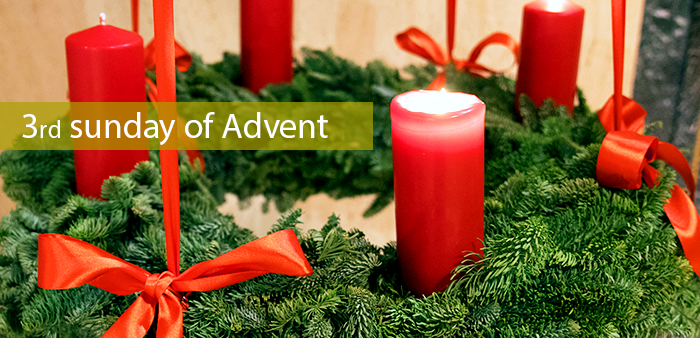
Zephaniah 3,14-18: Rejoice daughter of Sion
The beloved city is invited to come out of its loneliness and violence to enter into the state of “beloved” as God sees and wants. There’s a link between the beginning of this passage of Zephaniah and the greeting which the angel addressed to Mary at the home of Nazareth. This invitation to be joyful comes from the memory of the works of God (v.15), realized for the love of Jerusalem. God is in the midst of the people and there is no fear in it; what remains is joy, which also affects us when we are liberated from evil and violence. The nuptial tone is evident in the text. Always the journey of faith leads to a spousal relationship between God and His people and, ultimately, between God and the entire humanity.
Joel 2,21: “Do not fear, O soil; be glad and rejoice, for the Lord has done great things!
Jn 15,11: “I have said these things to you so that my joy may be in you, and that your joy may be complete”
Philippians 4,4-7: Rejoice in the Lord always
Joy is a great challenge because we understand that there are moments of joy, but there may be also many moments where is a lack of joy. The challenge seems to be to remember that joy should never be abandoned. We can be joyful because “The Lord is near”, now present in us and among us. We are at the heart of the Christian faith. We live and celebrate His presence among us in every instance, place and attitude of our lives. Peace is the supreme celebration of that “presence” of the Lord that that has been announced with the words: “The Lord is near”. Peace is the communion between us and God. Love between us and God, and among us. It is not a situation, but rather an incessant action, a continuous event.
Ecclesiastes 10,19: “Feasts are made for laughter; wine gladdens life”
Acts 5,41: “As they left the council, they rejoiced that they were considered worthy to suffer dishonour for the sake of the name”
Luke 3,10-18: What should we do?
John claims that his prophecy is the great occasion of conversion. The crowds receive the admonition of John the Baptist. Hence the sincere question posed by all: “What should we do?” In response, the Baptist suggests that regardless of the condition that one is in, nobody is excluded from the path of salvation. He shows that there is “progression” in the salvific event. He guarantees a preparation that allows the first steps, even those who are far away should look for the first signs of their new status. All of this is illuminated by the profound humility of John who compares himself with the One who is to come, presenting himself as the last of the servants, thus avoiding the danger of a misunderstanding and misappropriation. With his death in prison, he prophesies the cross of the Lord.
Jer. 42:3: “Let the Lord your God show us where we should go and what we should do”
2 Cor 5:10: “For all of us must appear before the judgment seat of Christ, so that each may receive recompense for what has been done”.
For personal or group reflection
– Can you find a reason to rejoice?
– Are you always joyful?
– Are you doing something interesting?


